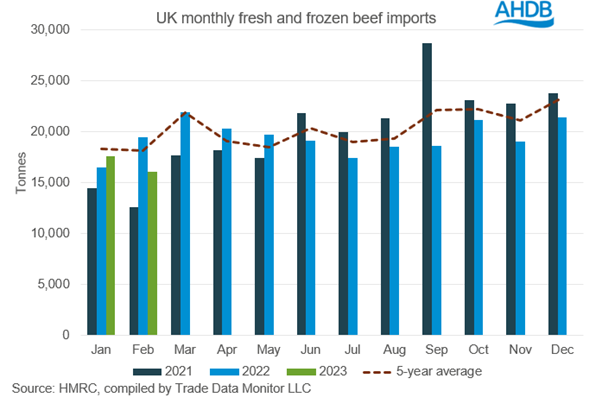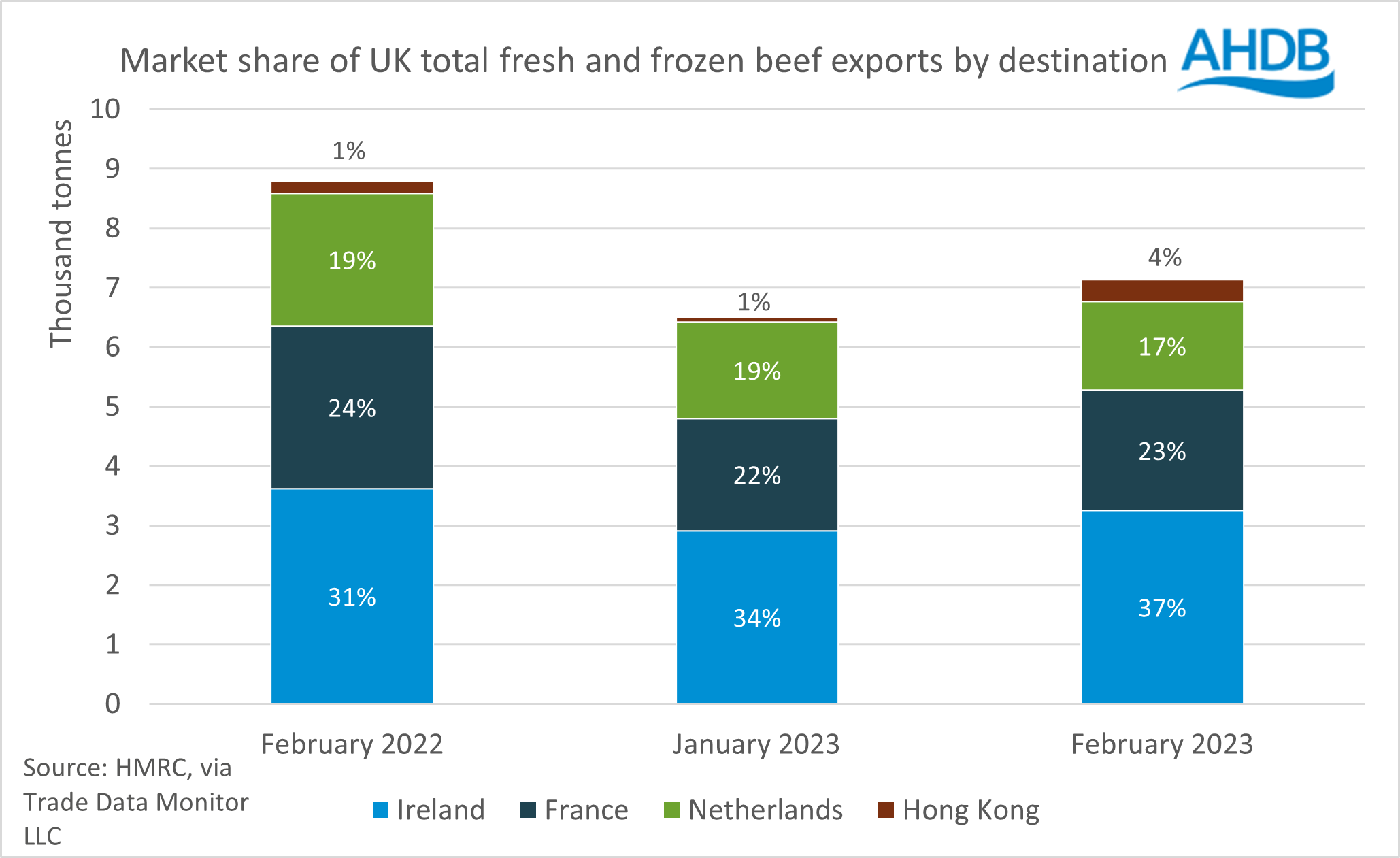UK beef shipments subdued in February
Thursday, 20 April 2023
Imports
Fresh and frozen beef imports for February totalled 16,100 tonnes, with a fall of 1,500 tonnes (9%) from January’s levels. The majority of this fall in imports came from Ireland, with a fall of 1,400 tonnes. This will likely be a reflection of subdued domestic retail demand. At the same time, Bord Bia report that cattle kill has tightened in 2023 in line with forecasts, likely contributing to recent price rises.
Compared to February 2022, UK imports have fallen by 3,400 tonnes, or just over 17%. We have seen a drop of nearly 1,900 tonnes from Ireland, nearly 500 tonnes from the Netherlands, and 400 tonnes from Poland. Year to date for 2023 (Jan – Feb) imports totalled 33,800 tonnes, representing a 6% fall from the same period in 2022.
Frozen boneless beef has seen the largest decline in the product categories both monthly and yearly, with total imports at just under 5,000 tonnes in February. From January 2023, there has been a drop of 1,200 tonnes (19%) of frozen boneless imports, and a fall of nearly 1,700 tonnes from February 2022. Fresh boneless beef imports for February totalled just under 8,900 tonnes, down 300 tonnes from January. Looking back to February 2022, imports of fresh boneless beef are down nearly 1,300 tonnes, a fall of 13%.

Exports
Total fresh and frozen beef exports totalled 8,800 tonnes in February 2023, an increase of 300 tonnes (3%) from January’s levels. Exports grew to Ireland and Hong Kong each by 300 tonnes, and France by 140 tonnes. Exports to Hong Kong increased from low levels seen in January, back to similar levels seen throughout 2022. The EU-27 continues to be the key destination for UK beef exports, with 89% of our total exports going to these countries in February, up from 85% on the previous year.
However, year-on-year, volumes of beef exports have fallen by 2,800 tonnes. This represents a 24% fall in volumes from February 2022 levels. Exports to the EU-27 have fallen by just over 2,000 tonnes, with a fall of 700 tonnes to France and 750 tonnes to the Netherlands. Exports to Ireland have also fallen by 375 tonnes compared to last February.
Boneless fresh beef was the most exported product in February, totalling 3,700 tonnes. This is an increase of 160 tonnes from January’s levels. Frozen boneless beef also saw a large monthly increase from January, up 200 tonnes (9%) to 1,400 tonnes for February. Fresh carcases and half carcases saw a monthly fall from January, down 150 tonnes (10%) to 1,400 tonnes.
However, looking year-on-year, fresh carcases have seen the largest fall, down almost 1,000 tonnes from February 2022, a fall of 42%. Fresh boneless beef exports have dropped 730 tonnes, down 17%. Frozen boneless beef has also seen falls in volumes exported from February 2022, down 600 tonnes.

Sign up for regular updates
You can subscribe to receive Beef and Lamb market news straight to your inbox. Simply fill in your contact details on our online form.
While AHDB seeks to ensure that the information contained on this webpage is accurate at the time of publication, no warranty is given in respect of the information and data provided. You are responsible for how you use the information. To the maximum extent permitted by law, AHDB accepts no liability for loss, damage or injury howsoever caused or suffered (including that caused by negligence) directly or indirectly in relation to the information or data provided in this publication.
All intellectual property rights in the information and data on this webpage belong to or are licensed by AHDB. You are authorised to use such information for your internal business purposes only and you must not provide this information to any other third parties, including further publication of the information, or for commercial gain in any way whatsoever without the prior written permission of AHDB for each third party disclosure, publication or commercial arrangement. For more information, please see our Terms of Use and Privacy Notice or contact the Director of Corporate Affairs at info@ahdb.org.uk © Agriculture and Horticulture Development Board. All rights reserved.

